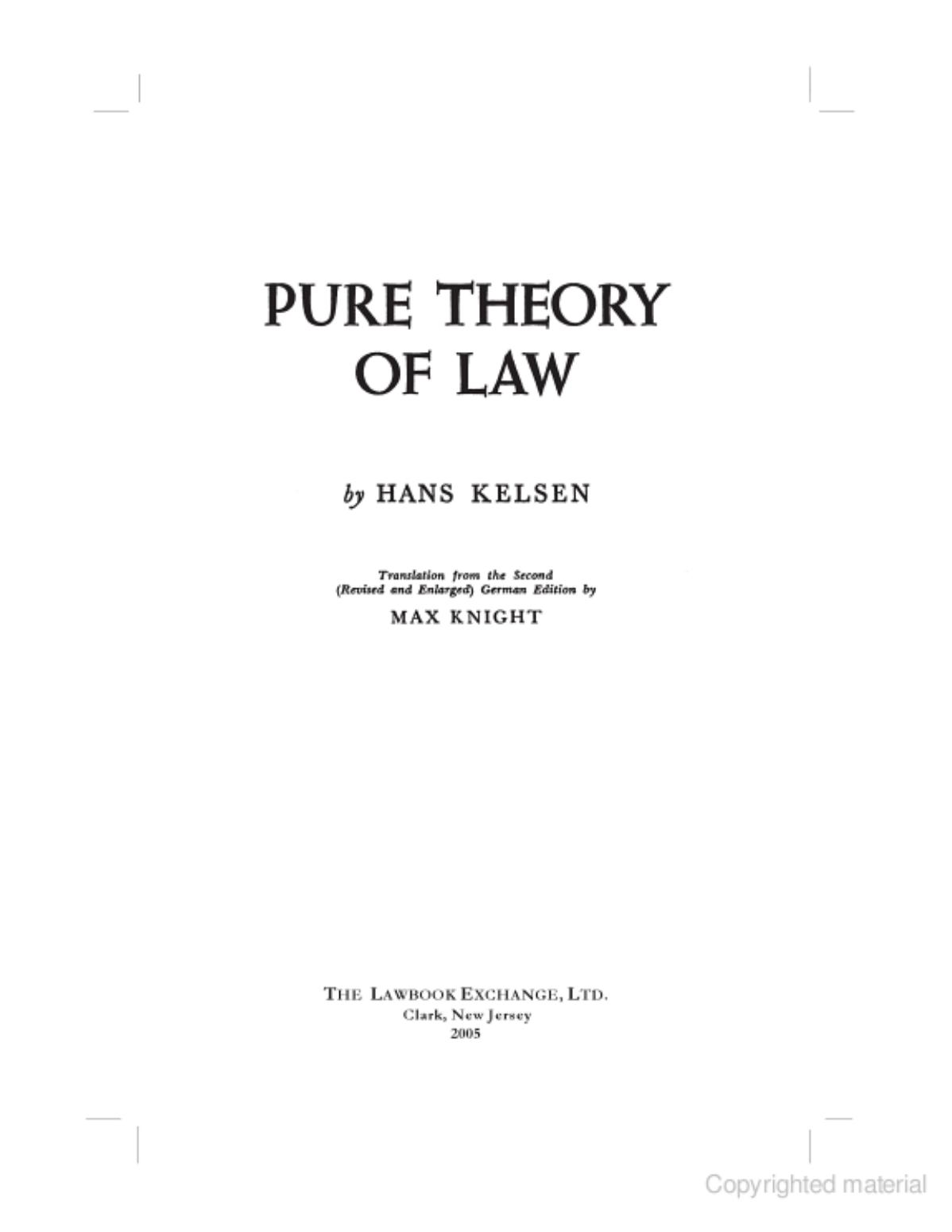Pure Theory of Law by Hans Kelsen

Author:Hans Kelsen [Kelsen, Hans]
Language: eng
Format: azw3, pdf
Publisher: The Lawbook Exchange, Ltd.
Published: 2014-10-31T04:00:00+00:00
Obligations of the juristic person
In the preceding discussion it has been assumed that the legal order establishes an obligation to behave in a certain way if it makes the opposite behavior, as the behavior of a human being, the condition of a sanction. The behavior which is the condition of the sanction is delict; the sanction is the consequence of the delict. Subject of an obligation, therefore, is the individual who, by his own behavior, can bring about or avoid the sanction—can commit the delict or refrain from committing it: the potential delinquent. If this concept of legal obligation is accepted, then an individual may be regarded as capable of being obligated (verpflichtungsfähig) only if he is capable of committing a delict (deliktsfähig).63
The situation with which we are confronted when the legal order establishes an obligation interpreted to be an obligation of a corporation as a juristic person is this: the legal order determines a behavior and attaches a sanction to its opposite, but leaves the determination of the individual through whose behavior the sanction is brought about or avoided to the statute of a corporation; and prescribes the sanction in such a way that it can be interpreted as being directed not against this individual, but against the corporation, which means that the liability for the nonfulfillment of the obligation (the suffering of the evil that the sanction represents) is attributable to the corporation. We will discuss later the basis of this attribution; for the moment we may merely state that the obligation—without the aid of the fiction of attribution—is the obligation of the individual who, by his behavior, can fulfill or violate the obligation, but that for the nonfulfillment of the obligation an other individual or individuals are liable with their person or property. The statute, in determining the individual whose behavior can fulfill or violate the obligation (by enabling, which in the broader sense means authorizing, this individual, and only this one, to behave in this way), also determines, indirectly, his behavior. Therefore the behavior by which the individual fulfills or violates the obligation, and therefore the fulfilled or violated obligation, can be referred to the statute, that is, the normative partial order constituting the corporation.
This is the situation when the obligation is attributed to the corporation as a juristic person (is interpreted to be the subject of the obligation) and the individual who actually fulfills or violates the obligation is considered to be an organ of the corporation. With the aid of this fictitious attribution the juristic person is represented as having the capacity of being obligated and of committing a delict.
The problem of the corporation’s capacity of being obligated and the much discussed and closely linked problem of its capacity of committing a delict are problems of attribution; and attribution is a mental operation which may, but need not be, performed; for the facts can be described without the aid of this mental operation, which in any case involves a fiction, particularly when a delict is attributed to a corporation.
Download
This site does not store any files on its server. We only index and link to content provided by other sites. Please contact the content providers to delete copyright contents if any and email us, we'll remove relevant links or contents immediately.
American Kingpin by Nick Bilton(3886)
Future Crimes by Marc Goodman(3598)
The Meaning of the Library by unknow(2571)
Inside the Middle East by Avi Melamed(2356)
Why Nations Fail: The Origins of Power, Prosperity, and Poverty by Daron Acemoglu & James Robinson(2297)
On Tyranny by Timothy Snyder(2231)
Living Silence in Burma by Christina Fink(2071)
Putin's Labyrinth(2022)
The Mastermind by Evan Ratliff(1937)
The Smartest Kids in the World by Amanda Ripley(1856)
Think Like a Rocket Scientist by Ozan Varol(1819)
Law: A Very Short Introduction by Raymond Wacks(1747)
It's Our Turn to Eat by Michela Wrong(1730)
The Rule of Law by Bingham Tom(1698)
Philosophy of law a very short introduction by Raymond Wacks(1670)
Leadership by Doris Kearns Goodwin(1638)
A Dirty War by Anna Politkovskaya(1630)
Information and Communications Security by Jianying Zhou & Xiapu Luo & Qingni Shen & Zhen Xu(1621)
Civil Procedure (Aspen Casebooks) by Stephen C. Yeazell(1556)
